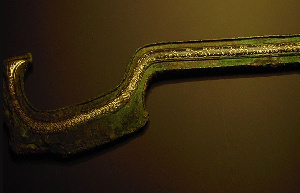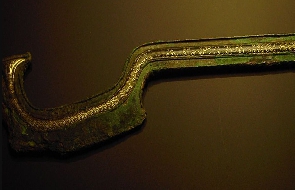Discover the ancient Egyptian sword Khopesh and how it became one of the most lethal in history

Swords, knives, and daggers have been the go-to weapons of choice for soldiers across the globe for centuries.
These deadly weapons altered the course of battles and sparked both fear and intrigue. Some weapons become as renowned as their owners, earning names for themselves along the way.
The Khopesh, a sword with a hooked blade that was sharpened on the exterior, was an important early example of the type that emerged in Egypt during the Bronze Age. The sickle-shaped swords, often fashioned of bronze, are thought to have originated in the Middle East and found their way to Egypt.
By the time of the New Kingdom, the khopesh was widely used by the military and highly regarded for its lethal cutting power in close proximity. Later, the khopesh was also used in ceremonies. It was often shown in art, and sometimes it was even found in the tombs of important Egyptians. A History.com report indicates that when the young pharaoh Tutankhamun was buried, he was buried with two sickle swords of different lengths.
According to expert calculations, the khopesh became the most common weapon in Ancient Egypt, and it may have been the first time a curved blade was employed in warfare. The khopesh first appeared in the Mediterranean Levant, which stretches from the Sinai Peninsula to modern-day Turkey. And since the third millennium B.C., this region and its inhabitants have had to deal with Ancient Egypt.
The Archaeologist report traces the origins of the khopesh to Sumer—the first known civilization in historical southern Mesopotamia—between the periods of 3000 and 2000 B.C. The khopesh is not a sword in the traditional sense, since swords evolved from daggers. Instead, it was a special kind of ax that was made to be used in battle.
Bronze was used to make the khopesh. Some swords were even made out of iron because it was a viable material for the blade. It was a bronze weapon, so it was also relatively short. These historical prototypes ranged in length from 20 to 24 inches. Longer bronze weapons like the Celts’ could be made, but they would be much less powerful.
Based on their shared physical characteristics, the hieroglyphs suggest that the word Khopesh could have been derived from “leg,” as in “leg of beef.” Khopesh quickly became the most common weapon in Ancient Egypt, along with the light war chariot. Khopesh’s rise to prominence as a status symbol can be traced back to the New Kingdom from 1570 to 1070 B.C.
It has been said that the khopesh was used to draw enemy shields, something that could not have been accomplished with a weaker weapon. While the khopesh is known as one of ancient Egypt’s most recognizable weapons, it was finally phased out in favor of more conventional swords somewhere about the 12th century B.C.
CLICK HERE TO DOWNLOAD PRESS RADIO MOBILE APP
Khopesh has been embraced by certain mainstream cultures, like the Egyptian culture depicted in the 1998 American animated drama The Prince of Egypt. Naja of Power Rangers Jungle Fury uses two khopeshes, and so did the Minotaur in The Chronicles of Narnia.
Source: face2faceafrica.com







